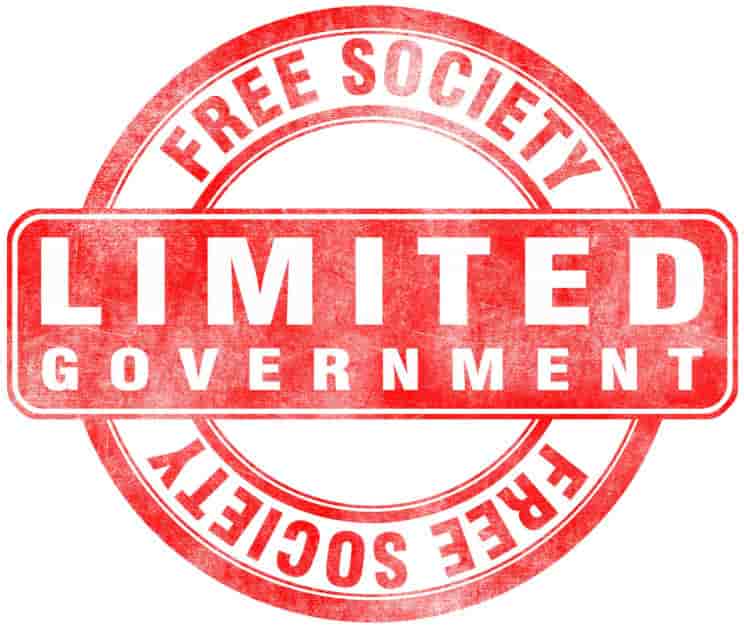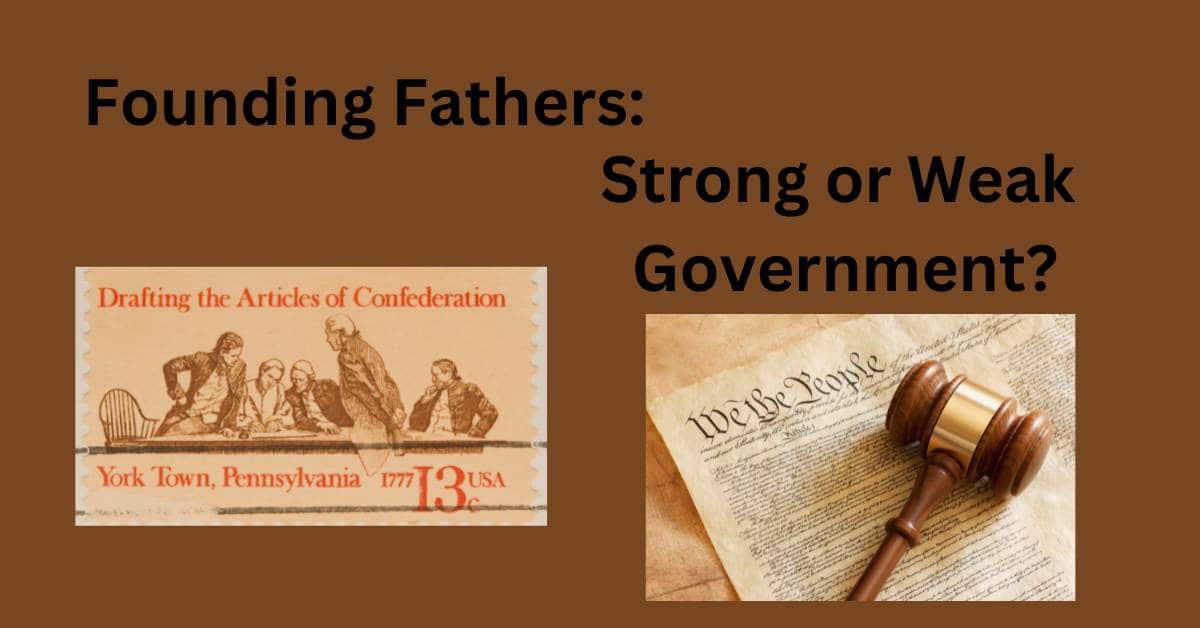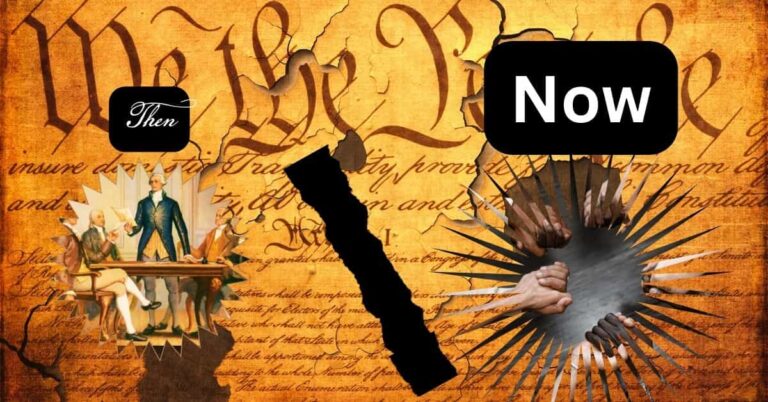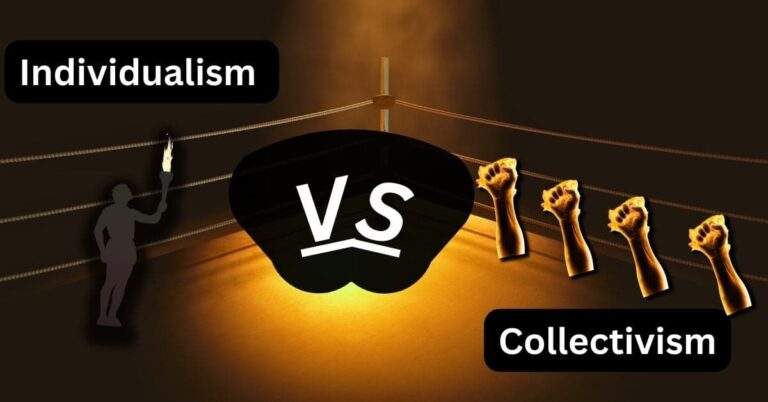Whenever you set out to do any type of physical activity such as running, working out, or splitting wood, you have 3 options. You perform the activity at a strong, medium, or weak intensity. The Founding Fathers faced a similar decision when deciding what kind of government America should have. What type of force should government exert? Strong, medium, or weak?
The United States is a strong but limited government. It is powerful in the areas dictated by the Constitution. However, the Framers wanted Federal power to remain weak versus the states’ rights. States needed to maintain their liberty and autonomy within a Federal system
America is an evolving project. Read below to find out how the Framers’ experiment turned out.
The Goal for the Founders’ Vision of Government
After the American Revolution concluded, we had a weak government. The most basic services didn’t exist. America formed a strong alliance to defeat the most powerful empire. But, we couldn’t solve disagreements among the states.
Quoting this famous line in Apollo 13:
“Houston, we have a problem!”
America had a problem that needed fixing
What would a stronger government resemble without sacrificing liberty?
Limited government was their solution.
What is a limited government?
A limited government is a constitutional political system that divides power. When one department exceeds its authority, another department impedes it. Thus, power is reduced to the branch – or individual- attempting an overthrow.
In other words, the Founding Fathers considered limited government a fail-safe system. It restricts power at the first sign of incompetence – or power-hungry maniacs.
If you ranked limited government on a scale of 1 to 10, it ranks as a 5. It isn’t too powerful but isn’t too weak.

Given what the Founding Fathers endured, British tyranny represented strong rule. The Founders didn’t want Americans to suffer as they had.
Compromising liberty for the sake of having a stronger authority is dangerous. Repressive regimes will cut your rights and take away your liberties if limited government wasn’t a foundation in the United States.
In the next section, we will explore what a stronger versus weaker government looks like.
And if you want to LEARN MORE about how the Constitution guards against tyranny, read my article.
Strong vs. Weak Government:
Government is the strongest enforcer. They have monopolies the average citizen does not have.
Here are some of their responsibilities:
- Justice
- Maintaining peace
- Defense
All of these powers enable a strong command of daily life.
However, the fundamental aspect of a strong government is centralization. How much power should the federal, state, and local administrations divide?
This brings us to a comparison between the Articles of Confederation vs. the Constitution.
Articles of Confederation: A Mistake of Weak Government
After the British surrendered, the Founding Fathers organized America into a confederation. A confederation? You ask?
Vocabulary has meanings that we overlook. We will examine its meaning.
Confederation denotes an alliance of independent states. Within a confederation, states act in their own self-interest. For example, Massachusetts doesn’t care how its decisions impact North Carolina.
There must be a main authority to regulate the overall interest of a nation. We refer to this as centralization.
The Articles of Confederation did a horrible job playing referee among the states. It didn’t adapt quick enough to changing scenarios.
Therefore, the first U.S. government lacked strong enforcement and enough centralization to maintain harmony.
Below we will examine the flaws of weak leadership.
Articles of Confederation Flaws
- Lacked a clear power structure
Undoubtedly, our national government during this era needed improvements. Day-to-day life required a concise chain of command to resolve conflicts. When you have states argue over trade routes, there needs to be a way to settle this dispute. Money complicates authority.
Thus, the organizational structure under the Articles of Confederation focused on the states with no clear centralization. A national consensus on regular issues never could be reached. This is like stepping into an elevator and deciding who will push the button. No one ends up pushing the button causing you to go nowhere.
- No clear way to directly elect representatives
You must have a way to satisfy the masses. People will feel abandoned and angry if their voice isn’t heard. I say this because state legislatures elected all members to Congress.
Hopefully, the state representatives voted on the best people for our national government. You had no say in the matter.
- Money! Where is it? No way to collect taxes
There are a couple lessons in life to learn. Businesses and governments don’t move unless they have 2 fundamentals: money and paperwork.
Money
Without money – or tax revenue, you can’t benefit from schools, bridges, and roads. Each is essential for a productive society.
Also, where is the money for the army? We like protection from foreign enemies who wish us harm.
There is a funny saying on Memorial Day that is overlooked. We thank veterans “for their service”. Their response should be “By the way, thank you for paying your taxes.” As I’ve said, the soldiers wouldn’t have the available equipment to do their job without taxpayer money.
Paperwork
Legal paperwork makes the world operate. If you don’t pay your debts, creditors will send you bankruptcy paperwork.
Governments operate on budgets and failing to pay debts generates severe consequences. Instability!
Hence, taxes are needed to prevent unwanted paperwork.
- Incompetent Amendment Process
Changes to a governing document ought to be intentional and rigorously debated.
Yet, a true test of a weak government is a complete unwillingness to change. Look no further than the Articles of Confederation.
To amend our first document, Congress needed to agree on an amendment. Once Congress approved a new amendment for ratification, every state legislature had to vote “yes” for the new amendment to be added.
Trying to make everyone agree on a “yes” is like trying to mop your floor with a toothbrush. It’s impossible. There will always be an outlier.
That’s a weak government when the Founders expected 100% to agree. Remember, the Articles of Confederation only gave power to the states and not you.
Constitution: A Government for the Strong
- Dynamic Power Structure
In the preamble, “We the People” gives power to American citizens. The Constitution also allowed for a stronger involvement of the states.
We have the House of Representatives, which is the “People’s House”. Citizens directly elect representatives in 2-year intervals allowing more frequency.
A stronger government will have multiple ways to elect representatives. Hence, we call this a representative democracy.
- Ability to raise taxes
As we discussed with the Articles of Confederation, Congress couldn’t collect taxes in early America. However, that changed with the adoption of the Constitution. Congress gained the enumerated power of collecting taxes under Article 1, Section 8.
We know that government is always thirsty for expansion and more money. They added the 16th amendment in 1913 to directly tax your income.
- Easier amendment process
To amend the Constitution, only ¾ of the states have to vote to ratify an amendment. While 75% is a supermajority of the states, it doesn’t require every single state to approve the change.
Yes, the Constitution is hard to amend. But, the Founding Fathers learned a valuable lesson on weak versus strong government. A government incapable of the smallest change is unacceptable to “We the People.” Even the slightest hope to be able to amend the Constitution allows citizens to trust for the future.
There is good and bad to anything. LEARN MORE about the pros and cons of the Constitution that I encourage you to check out.
Solution for Limited Government

Federalism became the solution for limited government. By having controls in different regions, local, state, and federal governments work in tandem to achieve the desired goal. Thus, maniacs who seek absolute power are limited.
There are 2 ways Federalism limits government:
1. Creates a more efficient government for us
- Forces cooperation of different departments
Each department has its place. They have a limited scope of responsibility and are experts in their field. For instance, you wouldn’t want the Environmental Protection Agency (EPA) involved in espionage and matters of national security. 2 different personality types are drawn to those jobs.
Consequently, different departments must work together to function as one government.
- Able to help with regional differences
It takes over 4 hours going 500 mph to go from Los Angeles to New York. That’s a huge expanse of land.
Americans will have different ways to solve problems with that much geographical separation. Your local city council is better equipped to fix neighborhood potholes than Congress.
Do you think Congress would listen to your request? I don’t think so.
- Creates social ties
Do California hippies and country hillbillies have anything in common?
You do.
You’re both Americans wanting what is best for your fellow citizens. You believe in change for the common good. You want a sense of community with like-minded people but will meet to cooperate when your quality of life is threatened.
2. Protected liberty from arbitrary central authority
Americans and liberty-minded folks don’t want tyranny. Dividing power into different branches, departments, and political offices keeps our government stronger for your benefit.
Arbitrary leaders turn into arbitrary tyrants. The definition of weak leadership is if those individuals acquire power. They will destroy tranquility and peace.
Thankfully, limited government through federalism helps protect Americans from that unfortunate scenario.
The debate to acquire this document is one for the centuries. But it included hard times. LEARN MORE about the problems faced at Constitutional Convention
Conclusion
With all the information above, we must decide whether the Founding Fathers created a weak or strong government. The goal became a government strong enough to adapt to citizens’ needs.
- Too strong leads to authoritarianism.
- Too weak lacks respect between citizens and other nations.
The Founding Fathers’ compromise became limited government. This organizational structure better protects liberty by restricting power in size and scope.
We compared and contrasted the difference between early and later American governing documents. The Articles of Confederation supported a weak government incapable of change and trust. However, the Founding Fathers recognized those weaknesses and changed course with the adoption of the Constitution. No longer did you need a unanimous vote to amend our governing document.
Also, one of the core fundamentals tying all of this together is the idea of federalism. Limited government and federalism are linked. Without federalism and dividing power among smaller groups, how would limited government function?
You must have a systematic approach to make limited government work. Federalism is that systematic approach.
Overall, America is robust today. We have law and order, a functioning economic system, and a high standard of living. We enjoy this because of a stronger government dedicated to preserving liberty.
Do you think our current federal government is too large?
J. Liberty
What are some other important ideas the Founders wanted us to know? LEARN MORE by finding their important thoughts.



